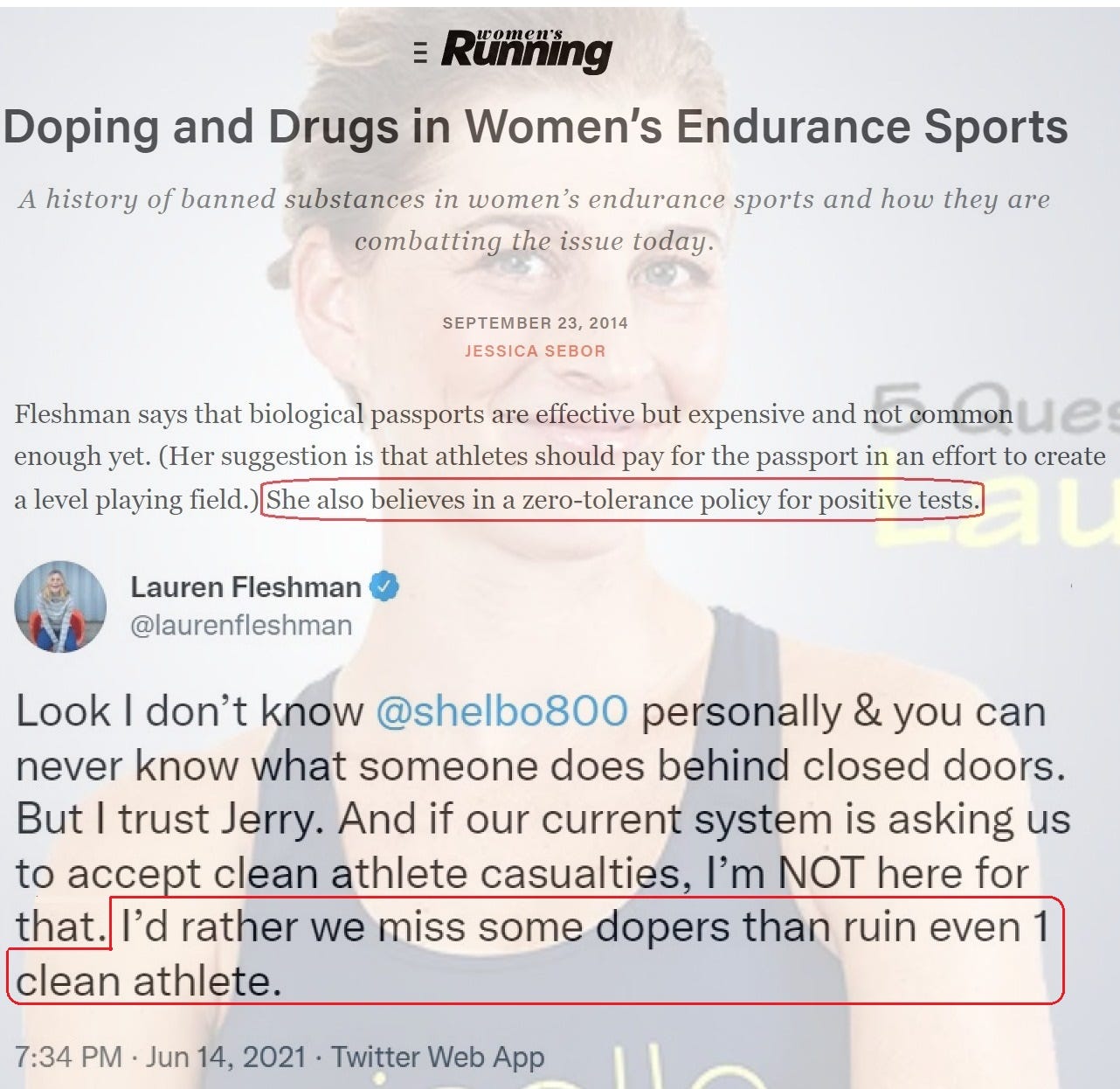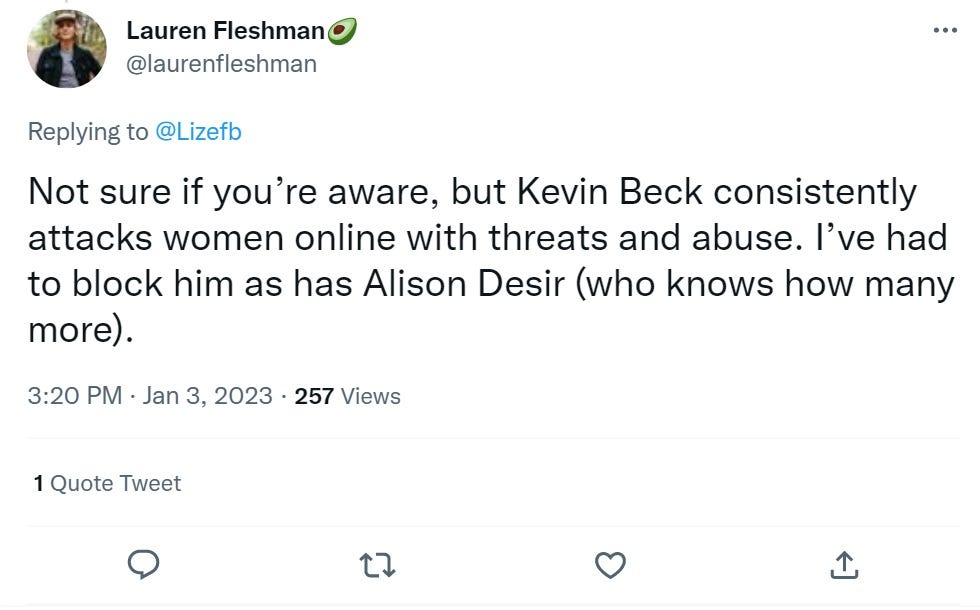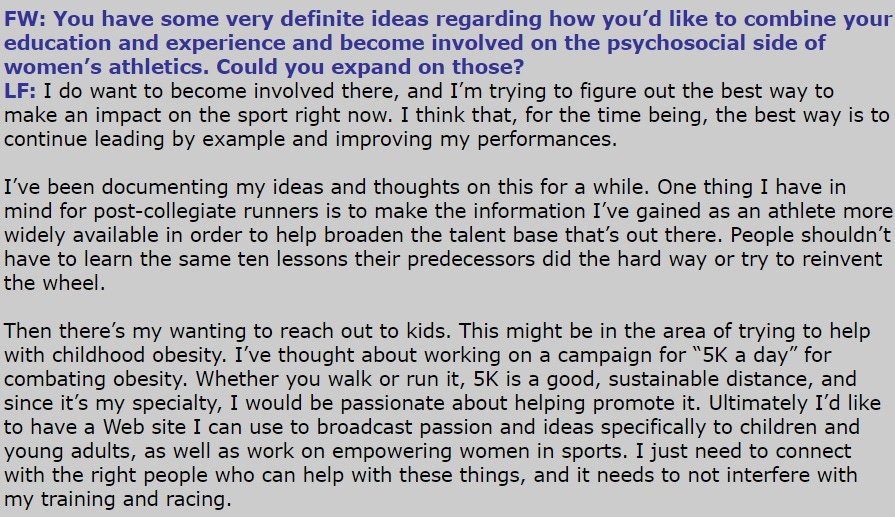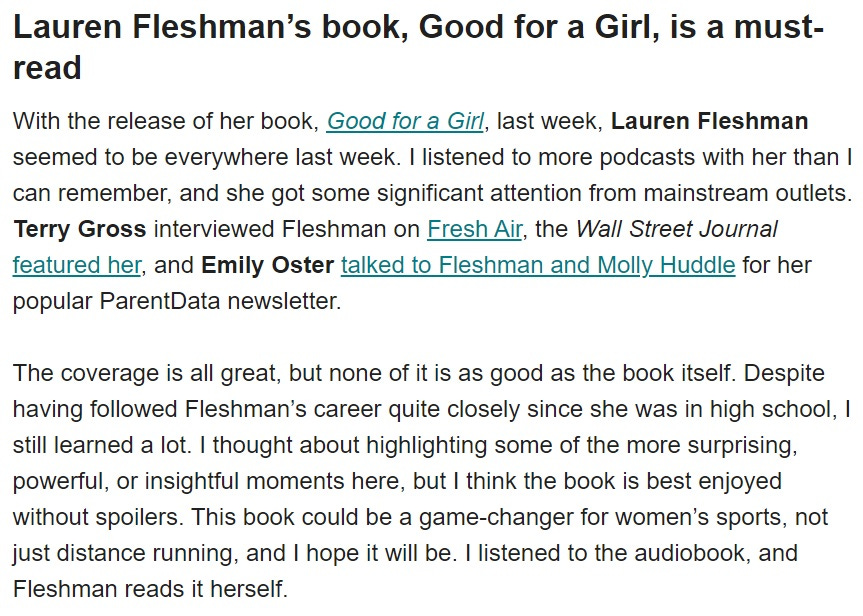Some Lauren Fleshman comments
Egomaniacs, however smart or successful, have always made poor role models. At least the reviews of "Good for a Girl" are good for a guffaw
Lauren Fleshman is a former professional runner whose autobiography (or autobiographical novel) Good for a Girl was recently published.
Executive summary: Although I believe Fleshman was a poor candidate all along for writing a “feminist manifesto” or otherwise advising a broad audience of young sportswomen, I also think there was a time—both in Fleshman’s life and in the sport’s cultural evolution—when this book might have been worthwhile despite its presumptive flaws and the demonstrated messaging deficiencies of its author. Pre-#MeToo and Wokism, Fleshman might have been encouraged to be humbler and more honest, and the reviews coming out wouldn’t look so ridiculous.
I’ve mentioned Fleshman on Beck of the Pack many times over the years, with these intermittent mentions becoming progressively less flattering. This post is divided into my views on the book itself, the person who wrote it, and the reception it has received.
THE BOOK
I didn’t read Good for a Girl, so this part is easy. All I can do is speculate based on available evidence that its narrator is unreliable across multiple subjects. I’ll get into that in detail in the next section, but Fleshman is an established hypocrite as well as a blatant liar.
As Lize Brittin noted in a recent post, I could have reported this tweet because it’s demonstrably false and could be reputationally damaging if I gave a fuck. As far as I know it’s still up and has gotten no likes from Fleshman’s 54,000 followers or anyone else. Lize is the one who retweeted it.
I don’t blame her, the race-grifter Desir, or anyone else for getting upset when I crawl up their asses for spouting nonsense, but this kind of response does a lot more harm to someone now being touted as a useful spokesperson than it does to her target.
THE PERSON
I interviewed Fleshman in 2006 with the approval of Alison Wade, then the editor of a version of Fast Women that was under the management of the New York Road Runners. What fun it would be to see Fleshman, me, Wade, and someone from the NYRR on the same stage today.
Noteworthy elements of this interview—which I thoroughly enjoyed doing—in light of developments in the past seventeen years include the coaches Fleshman singled out for praise (Vin Lananna and Dena Evans of Stanford, Bob Gagliano of the Nike Farm Team, and Terence Mahon of Running USA); how well she felt her experience at Stanford prepared her for professional running, which she was then less than three years into; and that, looking back, she has done exactly those things she set out to do, even if she’s done them imperfectly.
Fleshman announced that she’d officially inked a book deal in March 2020. Four months earlier, I wrote a post exploring why I thought Fleshman was too lacking in humility to position herself as the person she was by this time branding herself to be.
I have almost nothing to add to that now, other than Fleshman’s attitude toward sex, gender and male figures in the sport gradually eroding, or shifting, over time.
THE BOOK REVIEWS
Fleshman, like many other women involved in running, has capitalized on the uncanny momentum of well-off white females to surf on the back of Wokism—a “social justice” movement ostensibly aimed at elevating members of the underclasses—to not only survive cancellation but try to casually destroy her own rhetorical enemies with pissy tweets.
That said, I have to wonder how happy she is about having to play the game to the extent she needs to in 2023 to have her book strongly promoted. Take NPR, which produces a podcast titled Fresh Air.
I have news for National Public Radio, other than pointing out a grammatical miscue. I don’t know if Fleshman told them this, but breasts, hips, and menstruation are in fact obvious impediments to athletic performance. Were this not the case, you would occasionally see women with huge Carmen Electra-like knockers bouncing around finishing marathons in 2:18 with their inner thighs caked in fresh crimson glory. You will see this at around the same time as you will a Ryan Crouser-like specimen run a sub-13:00 5,000 meters. As much as we would enjoy watching all of this, it will never happen.
All these dumb broads had to do is change “performance” to “participation” and we’d be good. I don’t see how this kind of absurd dismissal of reality is useful for budding athletes at any level and whatever their goals, but this is an outlet that uses the term “birthing people” to describe women in the context of abortion. No women I know like that term—it’s as openly demeaning as the Wokish intend it to be.
The Atlantic, among the most unapologetic, preening proponents of government and Gates Foundation-based propaganda, also offered a review. The writer is from a nice part of Connecticut, still lives there, and based on her enthusiasm for traveling around to writing workshops, has been financially comfortable for her entire life.
She is therefore a member of the core readership of The Atlantic. Perhaps this is why, even as an experienced distance runner and coach herself, her main takeaway from Fleshman’s book is that women shouldn’t try maximally to succeed in running, given the potential harm this can lead to. Unless a similar “don’t push yourself in sports” message is being aimed at boys, how is Good for a Girl anything other than an anti-female “feminist manifesto”?
According to the article, this is a quote from the book (emphasis mine):
I saw and experienced this firsthand: Friends—ones who ran for female coaches—were publicly weighed or asked to write down and scrutinize everything they ate in a day. Even on my college team, where my coach never commented on size, the glorification of thinness was everywhere. Once, I heard another coach praise an athlete for looking as though she’d lost “a pound or a pound and a half.”
It’s one thing for someone to realize years after the fact that a situation she perceived as being healthy between the ages of 18 and 22 or so maybe wasn’t so healthy and to describe her own transformation from feeling immune to eating disorders to accepting them as a serious issue and blaming them on the very figures she idolized growing up.
But there has been none of that humility from Lauren Fleshman. At some point, she just decided to be a girl boss and pretend women like Lize haven’t been patiently trying to draw everyone under the same basic tent when it comes to “recovery.” Fleshman decided to play revisionist historian rather than embrace the very flaws that she’s been telling everyone else for years it’s okay to have.
The props for the book I’ve seen for Good for a Girl from female pundits connected to running evoke no more familiarity with its contents than commentary from someone who hasn’t read a word of it. Alison Wade of Fast Women (now Wade’s own project) had this to say.
So, the book is a must-read and a potential game-changer for women's sports, with surprising, powerful, and insightful moments, but Wade refuses to provide one clue as to why, how, or what, because this is a book is best enjoyed without spoilers. (Also, despite bragging about acquiring a Wokish sponsor when she published this edition of her newsletter, Wade failed to mention that it was Martin Luther King Jr. Day.)
There is also something missing from all the reviews I have read, and that’s any mention of how things are going with Lauren’s husband and daughter. (Quite frankly, her tweets about her daughter have at times transcended the mere expression of bemused motherly exasperation and come across as “this kid is just a pain in the ass.”) My guess is that Fleshman is presently off on some kind of sexual-romantic exploratory mission from which men are excluded. Probably in the wilds of Oregon, always a popular hunting ground for such things and close to home.
If I possessed the ethics of Lauren Fleshman, I would simply state this theory as fact and mix in the commission of a possible misdemeanor or felony. And I would bully the shit out of her friends. But if I’m even close in my guess, it would explain a lot of her mercurial ideas in recent years. If she sorts this out, maybe one day she’ll have the capacity to admit she was wrong. Despite her accomplishments and demonstrated eagerness to “open up,” this would be by far the most ambitious public undertaking of her life.








